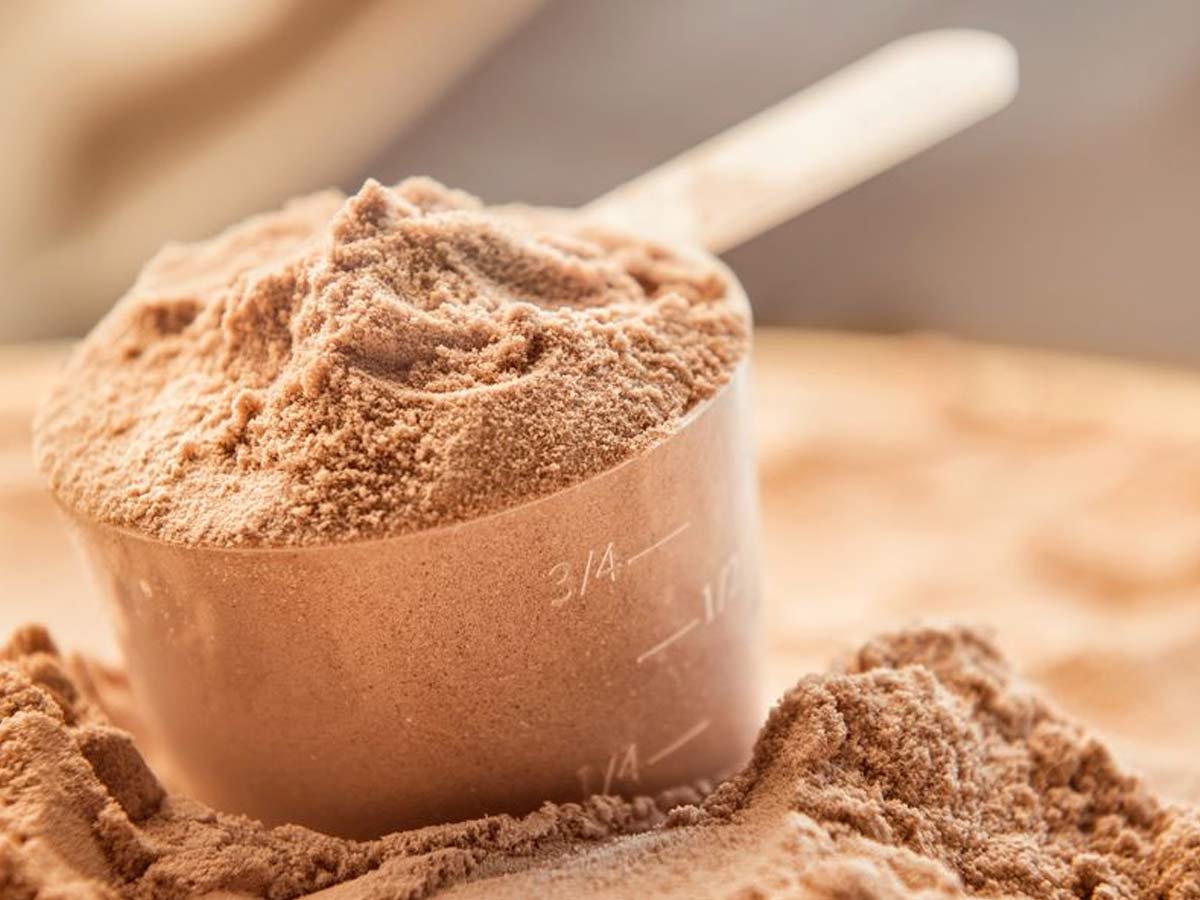Whey protein is often used as a supplement in conjunction with resistance exercise to boost muscle protein synthesis and stimulate the growth of lean muscle mass. But what precisely is it, and what are the benefits of using it?
Milk contains two types of proteins: casein and whey. Whey protein can be isolated from casein in milk or produced as a byproduct of cheese production. Whey protein is a complete source of naturally occurring proteins, and it contains all nine essential amino acids. It has a low lactose content.
There are numerous advantages to consuming whey protein, and researchers are constantly discovering new potential medicinal characteristics. We discuss what the benefits could be and some of the side effects and potential hazards in this section.
Is whey a fantastic source of high-quality protein?
Whey protein raw is the protein portion of whey, a liquid that separates from milk during the cheesemaking process. It contains all of the essential amino acids and is a full, high-quality protein. Furthermore, compared to other protein types, it is particularly digestible and swiftly absorbed from the intestine. Because of these characteristics, it is one of the greatest dietary sources of protein known.
Whey protein powder is classified into three types: Whey Protein raw (concentrate (WPC), isolate (WPI), and hydrolysate (WPH).

Whey protein concentrate (WPC) Whey protein raw/concentrate has a low fat and carbohydrate content. The percentage of protein in WPC or ray whey is determined by its concentration. Lower-end concentrates typically include 30 percent protein, whereas higher-end concentrates can contain up to 90 percent.
Whey protein isolate – WPIs are processed further to remove all fat and lactose. WPI or isolate protein is typically composed of at least 90% protein.
Whey protein hydrolysate (WPH) has already undergone partial hydrolysis, a step essential for the body to absorb protein. It is the cleanest and most predigested type of whey protein. WPH is easier to digest than the other two forms of whey protein.
Also Read, 10 High Protein Vegetarian food for Muscle building
Benefits Of whey proteins

Muscle Growth Is Promoted by Whey Protein
Muscle mass naturally reduces as we become older. This frequently leads to weight gain and raises the chance of developing a variety of chronic conditions. However, this unfavorable change in body composition can be slowed, stopped, or reversed with a combination of strength activity and a nutritious diet. When combined with a high-protein diet or protein supplementation, strength training has been demonstrated to be an effective prophylactic measure. Enriched-quality protein sources, such as raw whey protein, which is high in the branched-chain amino acid leucine, are extremely useful. Leucine is the most anabolic (promotes growth) amino acid.
Whey protein raw has been demonstrated to be somewhat better for muscle building than other forms of protein, such as casein or soy. As a result, whey protein raw is beneficial for preventing age-related muscle loss and improving strength and appearance. However, unless your diet is already deficient in protein, supplements are unlikely to have a significant effect.
Isolate Proteins Help in Weight Loss
Whey protein isolate is the purest form that implies extra protein to your diet. Protein is one of the most effective and significant weight-loss nutrients. Protein not only helps build muscle, but it can also boost your metabolism and satiety, making it simpler to achieve and maintain a healthy weight.
Many protein-rich foods need preparation, which might be difficult if you have a hectic schedule. Aside from that, protein powder is a quick and easy way to add protein to your diet. Protein powders can be rapidly blended with water, milk, or other liquids like smoothies and ingested. Whey is also more easily absorbed by the body than other proteins, allowing you to feel the benefits sooner.
Improves Strength
Whey protein boosts muscle mass and strength by producing anabolic hormones like insulin, responsible for muscular growth. The leucine component of the drug boosts muscle protein synthesis in our bodies. It contains protein and amino acids, which promote muscle building. Unlike other protein sources, whey protein promotes and aids muscle building more quickly and fastly.
It makes you feel fuller and allows you to eat less.
Whey protein raw has a fantastic influence on satiety. Protein ranks first among all macronutrients in terms of satisfaction. It increases energy expenditure, so balancing the number of calories consumed. According to studies, consuming a quarter of your daily protein intake reduces hunger cravings by 60%. Combining whey protein intake with weight lifting can shed roughly 8 pounds while boosting lean muscle mass. It not only increases your metabolism but also reduces your hunger and helps you keep lean muscle.
Aids in the regulation of blood pressure
Whey protein raw powder is useful in lowering blood pressure in hypertensive persons. Similarly, it acts as a deterrent to the development of potentially deadly cardiac issues.
Helps with post-exercise recuperation
It has been demonstrated that whey protein powder improves athletic performance. It increases your running speed and aids in exercise recovery.
Reduces cholesterol
Whey protein raw is more effective than casein protein for lowering total and LDL cholesterol.

Whey Protein Side Effects
When ingested in the recommended dosage, whey protein is usually regarded as safe for most adults. On the other hand, overconsumption of the combo may result in bloating, hyperactive bowel movement, and diarrhea.
Nausea, headaches, thirst, cramps, exhaustion, and a loss of appetite are all possible. If you are not diligent in adjusting your whey protein intake over time, you may get acne. Most people should be able to consume 1-2 scoops of the powder safely.
Adequate study into how it affects pregnant women has not been undertaken. If you are pregnant or nursing, it is advisable to avoid consuming whey protein. Furthermore, if you have dairy allergies, you should avoid consuming them.
Aside from those above, below are some other whey protein adverse effects.
1. Kidney issues
If you have kidney problems, avoid consuming whey protein. It may aggravate your kidney problems. It can also induce kidney stones. It is recommended that you consume appropriate dietary fiber and water as part of your diet to counteract this side effect.
2. Unwanted weight gain
Many whey protein powder products contain sugar, which increases your carbohydrate intake. Some of them may also contain fat. So, instead of increasing your protein intake to burn more calories, you may wind up consuming more than you need.
3. Gout
Gout research has identified no clear link between whey protein consumption and the development of gout. However, it has been discovered that incorporating whey protein in your diet if you have gout worsens your illness. If you have a family history of gout, talk to your doctor before beginning on whey protein.
4. Increased cardiovascular dangers
If you have heart problems, make sure you always eat whey protein in the recommended quantity. Excessive dosing may result in heart arrhythmia, cardiac arrest, and possibly full loss of cardiac functioning.
5. Osteoporosis
Excessive whey protein raw consumption over time may result in a mineral imbalance in your bones. As a result of the imbalance, bone density may be depleted, leading to osteoporosis.
6. Increase in blood acidity
The ingestion of whey protein raises the pH level in our blood. This extra protein is challenging for our kidneys to process. Our blood gets more acidic as a result.
7. Ketosis
In the absence of appropriate body fat, a high-protein, low-carb diet consumes energy from protein burning. Ketosis is a condition in which an abnormally high level of ketone bodies accumulates in the blood. Ketosis places immense strain on the liver’s ability to operate and can induce liver damage over time.
8. Wheezing and edoema of the face
Lactose intolerant people may have trouble breathing and experience allergic reactions such as wheezing, lip/mouth/throat swelling, and so on. If you find any of these symptoms developing, see a doctor right once.
Also Read, 11 High Protein Food for weight loss! Bonus with recipe
Conclusion
Whey protein powders and supplements are a safe and effective approach to increasing your regular diet’s protein content. It is an excellent source of protein that is easily absorbed by our bodies.
Whey protein is great for weight trainers, athletes, people who don’t get enough natural protein in their diet, and anyone else who could benefit from more muscle growth and strength, as well as reduced body fat. Protein is the most effective nutrient for increasing muscle mass and decreasing body fat. It is one of the greatest protein sources available. So, anyone wishing to increase their nutrient intake would be wise to invest in some whey protein powder.

























